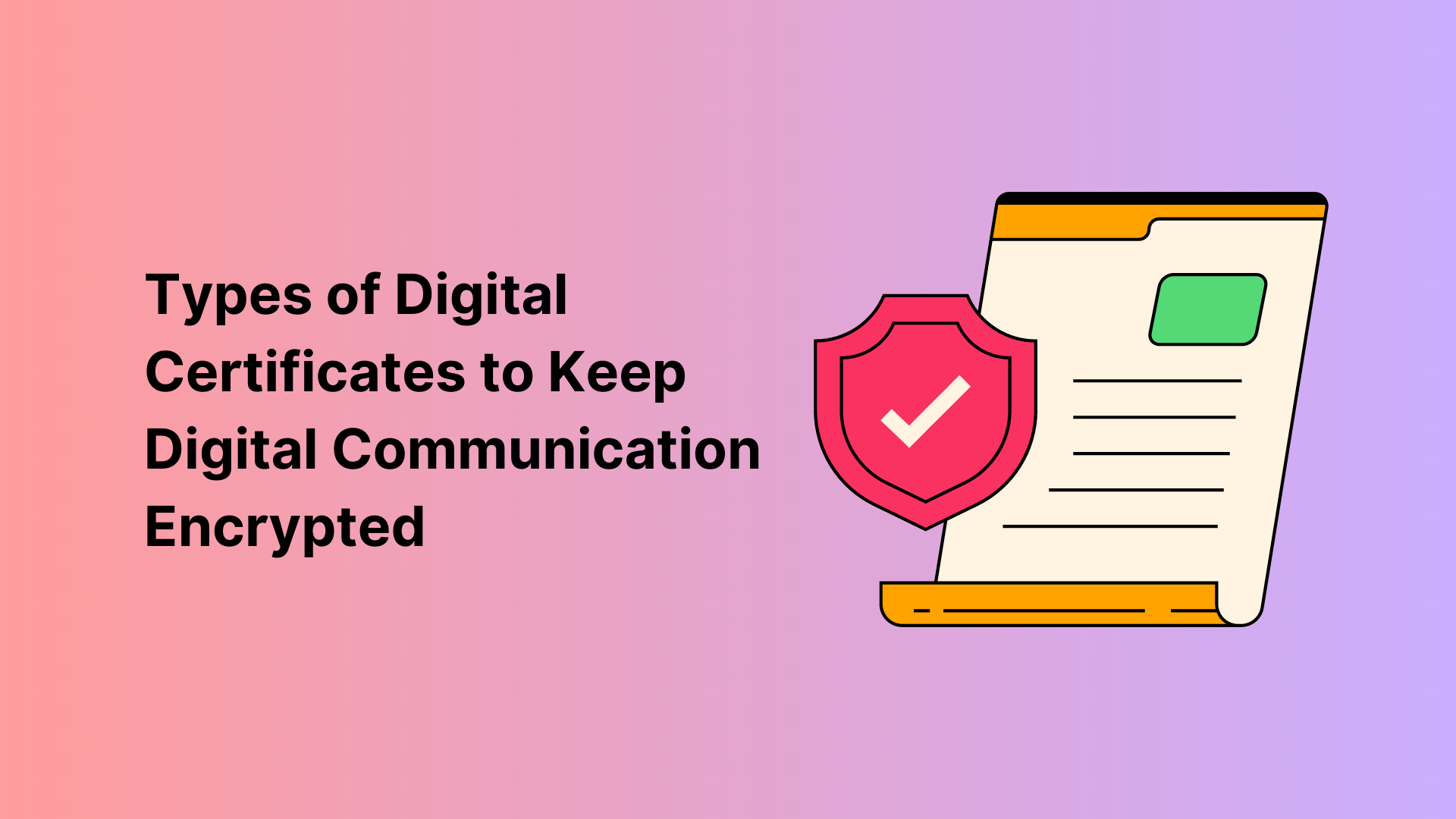Digital certificates are the unsung heroes of online security, playing a crucial role in ensuring secure communication, data integrity, and user authentication. For business owners, understanding the different types of digital certificates isn’t just a technicality—it’s a vital component of safeguarding your business’s digital assets. Imagine the consequences of not knowing this: data breaches, compromised customer trust, and potential financial losses. It’s clear that being well-versed in digital certificates isn’t optional; it’s a necessity.
This blog is your one-stop solution for all your questions about digital certificates. We’ll explain what they are, how they work, the most common types, who can issue them, and the benefits they offer. Whether you’re a tech enthusiast or new to online security, we’ve got you covered.
What Is a Digital Certificate?
Understanding Digital Certificates
A digital certificate, also known as a public key certificate, is a digital document used to verify the ownership of a public key. This document is issued by a trusted entity known as a Certificate Authority (CA) and contains essential details like the key owner’s identity, the public key itself, and the CA’s digital signature.
Digital certificates are crucial for securing online communication, ensuring data integrity, and verifying the identities of websites, individuals, or devices. By using cryptographic techniques, they enable secure and encrypted data exchanges over the internet.
Here are the key elements of a digital certificate that ensure its authenticity:
- Owner's Name: Identifies the individual or organization that owns the certificate.
- Public Key: The public key associated with the owner, used for encryption and verification.
- Certificate Authority (CA) Information: Details about the CA that issued the certificate, including their digital signature.
- Serial Number: A unique identifier for the certificate, issued by the CA.
- Expiration Date: The date until which the certificate is valid, after which it must be renewed.
- Digital Signature: A cryptographic signature by the CA that confirms the authenticity of the certificate.

These elements work together to ensure the certificate’s reliability and trustworthiness, enabling secure online interactions. For a more comprehensive understanding of digital certificates and their functions.
Digital Certificates vs. Digital Signatures: Key Differences
While often mentioned together in processes like when you sign a PDF online, digital certificates and digital signatures serve different purposes. A digital certificate is used to confirm the identity of the certificate holder, such as a person or organization. On the other hand, a digital signature ensures that a document or message has not been altered after it was signed.
In simple terms, a digital certificate tells you who sent the message, while a digital signature assures you that the message content is genuine and untampered.
How Digital Certificates Work
Digital certificates operate using a pair of cryptographic keys: a public key and a private key. The public key is included in the digital certificate and can be shared openly, while the private key is kept secure by the certificate owner.
When data is sent, it is encrypted with the recipient’s public key and can only be decrypted using the corresponding private key. This system ensures that only the intended recipient can access the information. Importantly, digital certificates have an expiration date, typically lasting one to two years, after which they must be renewed. This expiration helps maintain security and ensures that outdated certificates are not used.
Common Uses of Digital Certificates
Digital certificates are versatile tools that provide security and trust in various online activities.
They play a critical role in areas such as:
- Email Encryption: Digital certificates encrypt emails, ensuring that only the intended recipient can read the contents. This prevents unauthorized access and protects sensitive information shared via email.
- VPN Authentication: Virtual Private Networks (VPNs) use digital certificates to authenticate users and devices, ensuring that only authorized entities can access the network. This enhances security, especially for remote workers connecting to corporate networks.
- Secure File Sharing: Digital certificates are used to verify the identity of individuals and organizations involved in file transfers. They ensure that the files have not been tampered with during transit and that the parties involved are legitimate.

By using digital certificates, businesses and individuals can create a secure digital environment, protecting sensitive data and maintaining privacy. This enhances trust in online interactions, making digital certificates an essential component of modern cybersecurity practices.
Types of Digital Certificates in Network Security
1. Transport Layer Security/Secure Socket Layer (TLS/SSL) Certificates
TLS/SSL certificates are vital for securing online transactions by encrypting data between web browsers and servers. This encryption protects sensitive information like passwords and credit card numbers from being intercepted. There are three main types:
Domain Validated (DV): This type is the most basic and easiest to obtain. It confirms that the applicant has control over the domain but doesn’t verify the organization’s identity. It’s suitable for small websites where minimal encryption is needed, offering basic protection for visitors.
Organization Validated (OV): OV certificates provide a higher level of security by verifying the organization’s identity and domain ownership. This additional layer of verification builds more trust with visitors, making them more confident in sharing sensitive information.
Extended Validation (EV): EV certificates are the most stringent and provide the highest level of security. They require thorough vetting of the organization, ensuring it’s a legitimate entity. Websites with EV certificates display a green address bar, signaling to users that the site is highly secure and trustworthy.
To gain a comprehensive understanding of TLS/SSL certificates and their vital role in online security, click here.
for a detailed overview.
2. Code Signing Certificates
Code signing certificates are crucial for software developers who want to assure users that their software is safe to install and use. When a developer signs their software with a code signing certificate, it creates a digital signature. This signature verifies the software’s origin and confirms that it hasn’t been altered since it was signed.
For users, this means they can trust that the software is genuine and hasn’t been tampered with by malicious actors. This is particularly important for software distributed through third-party platforms, where the risk of malware is higher.
Even the most “trustworthy” file may contain malware. That’s why users should enhance their protection with dedicated security tools like MacKeeper, which scan systems for threats and remove any malware that slips through.
3. Client Certificates
Client certificates act like digital ID cards for users and devices, providing authentication and secure access to systems. In corporate environments, these certificates are often used to control access to sensitive internal resources. For example, an employee might need a client certificate to access company servers or databases.
This added security layer ensures that only authorized personnel can access critical systems, protecting against unauthorized access and potential data breaches. Client certificates can also be used for secure email communication, ensuring that messages are encrypted and only readable by the intended recipient.
4. Certificate Authority (CA) Certificates
Certificate Authority (CA) certificates are issued to entities known as Certificate Authorities, which are trusted organizations responsible for issuing digital certificates to individuals, businesses, and other entities. A CA certificate is essentially the CA’s digital signature, which validates the certificates it issues.
This creates a chain of trust, where end users can trust that a digital certificate issued by a recognized CA is legitimate. This system is foundational for secure online communications, as it ensures that the parties involved are who they claim to be, preventing phishing and other types of fraud.
5. User Certificates
User certificates are digital credentials assigned to individuals for authentication and secure communication. These certificates are widely used for email encryption, where they help ensure that only the intended recipient can read the message. For instance, if you’re sending sensitive information via email, a user certificate encrypts the message, making it unreadable to anyone other than the recipient.
User certificates are also used in virtual private networks (VPNs) to authenticate users, ensuring secure and private access to network resources. This type of certificate helps maintain data privacy and security in a variety of digital interactions.
For individual users, certificates support secure email communication and VPN access. If you’re planning to issue certificates for individual achievements, browse through these best certificate wording examples to craft compelling and appropriate messages.
6. Object-Signing Certificates
Object-signing certificates are used to sign digital objects such as software programs, Java applets, or ActiveX controls. This digital signature verifies the source of the object and ensures that it hasn’t been altered since it was signed. For developers, using object-signing certificates helps establish their credibility and trustworthiness.
For users, it provides assurance that the software or content they’re downloading is safe and hasn’t been tampered with. This is particularly important for software distributed over the internet, where the risk of downloading malicious or corrupted files is high.
7. Signature-Verification Certificates
Signature-verification certificates are used to validate digital signatures on documents, emails, and other types of content. When a document is signed with a digital signature, a signature-verification certificate can be used to confirm the authenticity of the signature. This means that the document hasn’t been altered and that it comes from a trusted source.
This type of certificate is essential in legal, financial, and other sectors where document integrity and authenticity are critical. It ensures that communications and transactions are secure and reliable.
8. Class 1/2/3 Certificates
Class 1/2/3 certificates offer different levels of security based on the type of user and the intended use:
- Class 1: These certificates provide basic encryption and are typically used for personal use, such as securing email communication. They validate the user's identity and email address, offering a fundamental level of trust and security.
- Class 2: Suitable for business transactions, Class 2 certificates provide a higher level of validation, including verification of the user's identity against a known database. This makes them ideal for securing online transactions and other business communications.
- Class 3: These certificates offer the highest level of security and are used for high-value transactions and sensitive data protection. They require in-person verification and are typically used by large organizations and financial institutions to secure sensitive operations.
9. Public Key Certificate
A public key certificate is like a digital passport for secure communication. It contains the owner’s public key, which can be shared with others, and is used to verify the owner’s identity. Issued by a trusted Certificate Authority (CA), the public key certificate allows secure data exchange by enabling encrypted communication.
When a message is encrypted with a public key, only the corresponding private key, which is kept secret, can decrypt it. This ensures that sensitive data remains confidential and secure during transmission, protecting against eavesdropping and data breaches.
Who Can Issue a Digital Certificate?
Digital certificates are issued by trusted entities called Certificate Authorities (CAs). These CAs verify the identity of the requester before issuing the certificate, ensuring that it’s legitimate and trustworthy. Think of CAs as the gatekeepers of digital trust. Major players in the CA world include CertifyMe, DigiCert and Let’s Encrypt, known for their rigorous verification processes and reliability.
Organizations can also create their own internal Certificate Authority. This is especially useful for managing certificates within a company, providing a tailored security approach for internal systems and communications.
Whether from a major CA or an internal authority, the role of issuing a digital certificate is crucial in maintaining security and trust in digital interactions. Understanding who issues these certificates helps you appreciate their importance in keeping your online communications and transactions secure.
Best Way to Issue, Manage, and Send Digital Certificates
To issue, manage, and send digital certificates effectively, a digital credential platform is essential. This type of platform streamlines the entire process, from creation to distribution, ensuring security and efficiency.
In my experience, CertifyMe stands out as a practical choice for both newcomers and experienced users. It’s known for its user-friendly interface, making it easy for beginners to get started without a steep learning curve. Plus, it offers a free option, which is great for those just starting out.
Beyond that, CertifyMe has unique features like customizable templates, automated workflows, and detailed reporting, which make managing digital certificates both simple and efficient.
To issue, manage, and send digital certificates effectively, a digital credential platform is essential. If you’re looking to create beautiful certificates with minimal effort, you can also explore 15 free certificate maker tools that simplify the design process while maintaining professional standards.
Benefits of Digital Certificates

Secure Online Communication
Digital certificates are essential for safeguarding online communications. They encrypt data in transit, which prevents unauthorized access and protects against data breaches. This means that every time you send sensitive information, digital certificates ensure that it reaches its intended recipient securely.
Build Trust with Users and Customers
Trust is vital in online interactions, and digital certificates play a key role in establishing it. By verifying the identity of websites, software, and emails, they assure users that they are engaging with a legitimate source. This verification builds confidence and helps in maintaining a positive relationship with customers.
Scale Easily Across Business Operations
As your business grows, so do your security needs. Digital certificates scale effortlessly across operations, providing secure communication and transactions for organizations of all sizes. This scalability ensures that your security measures evolve with your business.
Reduce Hardware and Infrastructure Costs
Implementing digital certificates can lead to significant cost savings. By reducing the need for extensive physical security measures and hardware, organizations can lower their infrastructure costs while still maintaining robust data protection.
Enhance Credibility and Legal Compliance
Digital certificates enhance your organization’s credibility by offering a verifiable identity and reinforcing legal compliance. They ensure data integrity and authenticity, which are crucial for meeting regulatory requirements and building trust with stakeholders.
Digital certificates help build trust and credibility in both business and education. For learners and educators, you can also explore how to achieve educational goals through digital badges as a complementary approach to traditional certificates.
Simplify Access and Identity Management
Managing user access and identity can be complex, but digital certificates simplify this process. They provide a secure and efficient method for authenticating users and devices, streamlining access management across your organization.
Protect Sensitive Transactions and Data
For businesses handling sensitive transactions and data, digital certificates are indispensable. They encrypt information, ensuring that only authorized parties can access it. This protection is vital for maintaining confidentiality and preventing unauthorized access.
Ensure Privacy and Optimize Costs
Privacy is a major concern in today’s digital world, and digital certificates address it effectively. By securing data from unauthorized access, they help maintain privacy and reduce the need for physical security measures, ultimately optimizing costs.
Conclusion
In wrapping up, understanding digital certificates is crucial for anyone navigating today’s digital landscape. We’ve explored how these certificates safeguard online communication, build trust, and streamline operations, among other benefits. The goal of this blog was to demystify digital certificates, showing you their importance and how they can enhance security and efficiency in your online interactions.
By now, you should have a clearer picture of how digital certificates work and why they are indispensable for secure, trustworthy, and efficient digital operations. Whether you’re managing a business or simply looking to protect your personal information, digital certificates offer a robust solution.
If you’re interested in making the management of digital certificates easier and more streamlined, consider checking out CertifyMe. With its user-friendly interface and comprehensive features, including a free sign-up option, it could be just the tool you need to simplify your digital credential processes.

 Author :
Author : 




